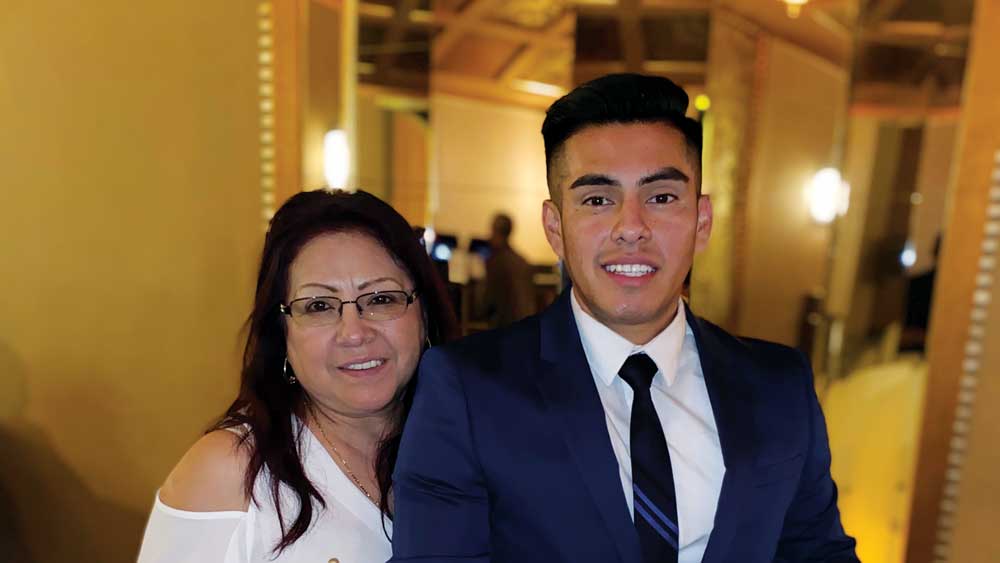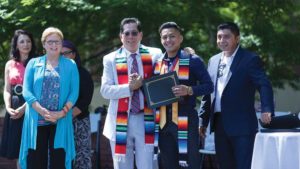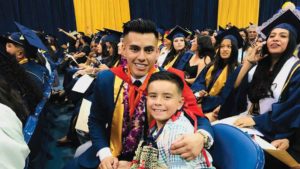
Jordan Carbajal’s life is an immigrant’s success story: a 4-year-old who speaks no English leaves his home in Peru to grow up in Sonoma County, where he excels in his K-12 studies, and then becomes student body president at Santa Rosa Junior College. He later graduates from UC Davis with a degree in political science and Chicana/Chicano studies, and now works at the state Capitol in Sacramento as a legislative advocate for California YIMBY (Yes In My Back Yard). The organization promotes affordable housing in California by, among other strategies, addressing and correcting system inequities in the state’s housing laws, and drafting and advocating for proven legislative solutions that accelerate the pace of home building.
Carbajal, 27, reflects on his Sonoma County upbringing, his education and the many opportunities he’s enjoyed working with lawmakers in his pursuit of advocating for affordable housing in the state.
How did you end up living in Petaluma after leaving Lima, Peru, at the age of 4?
My parents took the leap to come to America. It was somewhat politically motivated, and they just thought it was the best time to leave Peru. One day I was playing in a park in Lima and the next day I was on an 11-hour flight to the Bay Area. I had an aunt already living in Sonoma County, and my older sister had left Peru earlier to come here, so we all settled in Petaluma.
What was it like growing up in Petaluma?
Petaluma was a great place to grow up because it has a small hometown kind of feel. It was very welcoming, and meeting other people with similar backgrounds to mine made it easier to adapt, as English became my second language. We lived in west Petaluma near the downtown area and I could take the bus to get around. I went to elementary and middle school there, then graduated from Casa Grande High School, and I stayed in Petaluma until leaving for college. My parents still live in Petaluma.
You were student body president at Santa Rosa Junior College during the 2016-2017 school year. What was that leadership experience like?

When I first joined SRJC, I was 18 and was mentored by Rafael Vazquez, an outreach specialist at the school. He really helped me get into a space of public service, and that’s when I decided to run for student body president, representing more than 20,000 students. It was a phenomenal experience, and Dr. Frank Chong, the school’s president, helped me out all the way. I worked closely with him and we had some big achievements, including partnering with Redwood Empire Food Bank to provide food to students in need.
I was also one of the founders of the Undocumented Student Union, a place for undocumented students to have a gathering spot at the JC. From that we created the Dream Center, a one-stop shop for these students to get assistance with legal services, health and mental wellness, financial aid guidance and numerous other resources.
When did you develop your passion for pursuing public service?
It comes partly from my childhood experiences. It’s always been in the heart for me, kind of a selfless thing. But my passion really took off when I saw the importance of the Undocumented Student Union. I realized how many people rely on scholarships, and these are students who also have some very basic needs, such as books and bus passes. Having that experience, I made a commitment to myself to go into public service.
When I graduated from SRJC, I spent a summer interning for Congressman Mike Thompson in Washington, D.C. Even before I left the JC, I was interning in the congressman’s Santa Rosa office. During my time as an undergrad at UC Davis, I was chosen for an internship with California Senator Mike McGuire’s office in Sacramento. Then in 2019, I became a United States citizen, in a ceremony conducted in Oakland.

While I interned with Senator McGuire’s office, I was encouraged to join the Assembly Fellowship Program [which seeks highly motivated individuals who are passionate about the state of California, public policy and politics]. I’d never heard of it, but Senator McGuire had three fellow alums who had become part of his staff. I eventually went into the Fellowship program after college in 2019 and through 2020, where I was placed in the office of California Assemblymember Dr. Shirley Weber, who was later appointed the first Black California Secretary of State. After working with Dr. Weber, I joined the office of then-Assemblymember Rob Bonta, now the state’s attorney general.
When did you realize your calling was in promoting the building of low-income and affordable housing in California? Was there a personal experience that led you into housing as your cause?
I grew up living in apartments most of my life, and when my family could finally afford to buy a home here, we kept getting shut out by people paying cash for properties. With a family like mine, the hope was to build some generational wealth, and we were eventually able to buy a home.
After a few years interacting with the California legislature, I became aware of the California YIMBY [Yes In My Back Yard] organization. My first interaction with the group was in 2021 when they sponsored a bill, AB 889, I was working on with my former boss, assemblymember Mike Gipson. I joined the organization almost a year ago as their legislative advocate. California YIMBY is a 501(c) 3 and 501(c) 4 organization. The (c) 3 designation is the grassroots movement-building organization and nonprofit focusing on educating Californians on causes and solutions to housing shortages and the affordability crisis. We also have an active lobbying arm, (c) 4, that both writes housing policy and lobbies elected officials in the state legislature to get it passed, so I’m registered as a lobbyist.
What is California YIMBY’s role in ultimately getting affordable housing built in the state?
The organization doesn’t only promote low-income housing but is focusing on the housing shortage for all Californians, and the “missing middle” as we call them––typically the Californian who earns too much to qualify for low-income housing but doesn’t earn enough to compete in the regular housing market. The more we can build housing, the more equal it will be for Californians. [See sidebar describing four housing bills sponsored/co-sponsored by California YIMBY and recently signed into law by Governor Gavin Newsom.]
The last few years have been tough on families here. Many jobs didn’t come back after the pandemic, and people are having to commute farther to work. But the goal of California YIMBY is to keep more families living and working within their own communities.
The YIMBY Effect
New California housing legislation championed by Yes In My Back Yard
Three significant housing bills sponsored or co-sponsored by California YIMBY––AB 2011, SB 886 and AB 2221––were signed into law in late September 2022 by Gov. Gavin Newsom. Every priority housing bill introduced by California YIMBY for the 2021-2022 session was signed into law, according to the organization.
The most sweeping housing and land use reform legislation is AB 2011, which allows affordable housing to be built “by-right” in commercially zoned districts, with strong protections for the environment and labor standards, such as prevailing wages and health insurance. “AB 2011 is one of the most significant housing bills of this legislative session, and could unlock the potential for millions of affordable homes in California,” said Brian Hanlon, CEO of California YIMBY, in a prepared statement. “California has a huge amount of under-utilized and abandoned commercial properties that could see rapid development of subsidized affordable housing under this legislation. This is a game changer for housing in our state.”
SB 886 would make it faster and easier for the University of California, California State University, and community colleges across the state to build student and faculty housing on or near their campuses. “This is a long overdue measure that will allow our state universities to catch up to the massive student and faculty housing shortage on their campuses,” said Hanlon.
AB 2221 clarifies state housing law to make accessory dwelling units (ADUs) or “casitas” easier to build, particularly in unused commercial space, in “missing middle” housing and in existing single-family homes. “ADUs are one of the most popular and fastest-growing forms of housing in our state,” said Hanlon.
A fourth bill co-sponsored by California YIMBY––AB 2097––was signed into law by Newsom earlier in September. It is designed to reduce the cost of housing while slashing the pollution that causes climate change by eliminating expensive parking mandates for homes and commercial buildings near transit, or in neighborhoods with low rates of car use. Parking mandates, which require parking for cars to be included in new housing, are common in cities across California and can add $40,000 or more per parking space to the cost of construction, while also increasing climate pollution.
Author
-

Jean Doppenberg is a lifelong journalist and the author of three guidebooks to Wine Country.
View all posts



